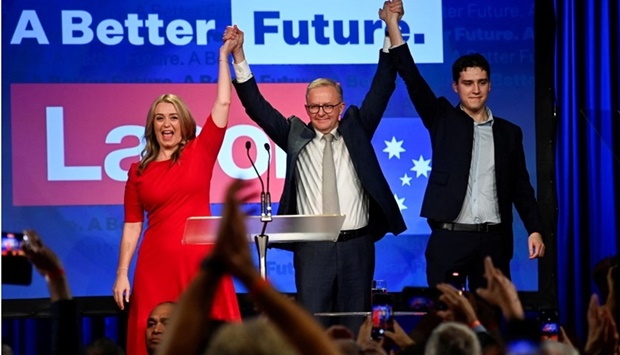* Morrison to quit as Liberal Party leader after loss
* Treasurer Frydenberg looks likely to lose seat
* 'Teal' independents set to win a handful of seats
* Greens projected to add up to three seats to existing one
Australian Prime Minister Scott Morrison conceded defeat in an election on Saturday and the opposition Labor Party was set to end almost a decade of conservative rule, possibly with the support of independents who campaigned for greener policies.
Partial results showed that while Labor had made small gains, Morrison's Liberal-National coalition had been punished by voters in Western Australia and affluent urban seats in particular.
The Greens and a group of so-called "teal independents", who campaigned on policies of integrity, gender equality and tackling climate change, put on a strong showing, tapping voter anger over inaction on climate change after some of the worst floods and fires to hit Australia.
The new parliament looks set to be much less climate-sceptic than the one that supported Morrison's pro-coal mining administration.
"Tonight, I have spoken to the leader of the opposition and the incoming prime minister, Anthony Albanese. And I've congratulated him on his election victory this evening," Morrison said, adding he was stepping down as leader of his party.
Albanese, speaking as he headed to his party celebrations, said he wanted to unite the country.
"I think people want to come together, look for our common interest, look towards that sense of common purpose. I think people have had enough of division, what they want is to come together as a nation and I intend to lead that."
In results so far, Labor had yet to reach the 76 of the 151 lower house seats required to form a government alone. Final results could take time as counting of a record number of postal votes is completed.
With 55% of the vote counted, Labor had 72 seats and Morrison's coalition 52. Independents and the Greens held 11, the Australian Broadcasting Corp projected. A further 16 seats remained in doubt.
The centre-left Labor had held a decent lead in opinion polls before the election, although surveys showed the Liberal-National government narrowing the gap in the final stretch of a six-week campaign.
In one of the biggest hits to the government, Treasurer Josh Frydenberg said it would be "difficult" for him to hold the long-held Liberal seat of Kooyong in Melbourne against an independent newcomer.
Three volunteers working for teal independent Monique Ryan, who was challenging Frydenberg, said they joined Ryan's campaign because they were concerned about the climate for the sake of their children and grandchildren.
"For me, it's like this election actually feels hopeful," Charlotte Forwood, with three adult children, told Reuters.
With Morrison's resignation and Frydenberg likely to lose his seat, Defence Minister Peter Dutton - a former policeman from Queensland - was shaping up as favourite to lead the Liberal Party.
Early returns suggested the Greens had made ground, looking to pick up to three seats in Queensland.
Greens leader Adam Bandt, who retained his inner city Melbourne seat, said climate was a major issue for voters.
"There was an attempt from Labor and Liberal to bury it, and we were very clear about the need to tackle climate by tackling coal and gas."
Morrison and Albanese cast their votes in Sydney after making whistle-stop tours across marginal seats in the final two days of a campaign dominated by rising living costs, climate change and integrity.
As Labor focussed on spiking inflation and sluggish wage growth, Morrison made the country's lowest unemployment in almost half a century the centrepiece of his campaign's final hours.

Anthony Albanese, leader of Australia's Labor Party is accompanied by his partner Jodie Haydon and son Nathan Albanese to address his supporters after incumbent Prime Minister and Liberal Party leader Scott Morrison conceded defeat in the country's general election, in Sydney, Australia. REUTERS
